A top Belarusian diplomat who had been appointed the first ambassador to the United States in nearly 12 years has died.
This post was originally published on Radio Free.
A top Belarusian diplomat who had been appointed the first ambassador to the United States in nearly 12 years has died.
This post was originally published on Radio Free.
The Catholic archbishop of Minsk is in Belarus for Christmas after authorities lifted a four-month ban on his entry to the country amid massive anti-government protests.
Archbishop Tadeusz Kondrusiewicz, the leader Belarusian Catholics, was denied entry on August 31 as he returned from a trip to neighboring Poland.
Some of the key events that have followed the contested reelection of longtime Belarusian President Alyaksandr Lukashenka.
The 74-year-old spiritual leader was barred from his homeland after he criticized the crackdown on protests against the contested reelection of strongman Alyaksandr Lukashenka.
The archbishop was allowed to return after an envoy from the Vatican met Lukashenka last week in Minsk.
“When I crossed the border, I knelt down and prayed, I kissed this land,” Kondrusiewicz said in comments on December 24, adding that “the Fatherland cannot be thrown out of the heart.”
“This is my land. I grew up here, I want to be here, I want to serve here. And I have never opposed Belarus, I have always defended the interests of Belarus and I will continue to do so,” the metropolitan said.
Kondrusiewicz was able to lead Christmas Eve mass at Minsk’s main Cathedral.
Catholicism is the second largest religious denomination in Belarus, after Eastern Orthodoxy.
This post was originally published on Radio Free.

MINSK — The head of the Belarusian Press Club, Yulia Slutskaya, has been detained by police in Minsk. Authorities have also searched the offices of the independent journalistic organization and the homes of some of its members.
Slutskaya’s relatives said on December 22 that she was detained when she arrived back in Belarus after a holiday abroad where she had spent time with her daughter and grandchildren. The relatives said they do not know Slutskaya’s current whereabouts.
Meanwhile, the program director of the Belarusian Press Club, Ala Sharko, informed the Belarusian Journalists’ Association that police stormed into her apartment on December 22.
Sharko’s lawyer, Syarhey Zikratski, says police forced him out when he arrived at the apartment during the search operation.
The Belarusian Press Club said via its Instagram account that police also searched the apartment of Syarhey Yakupau, the director of the group’s educational programs.
The moves come just days after the New York-based Committee to Protect Journalists (CPJ) listed Belarus as a country where authorities have significantly increased their arrests of reporters in recent months..
The arrests come as mass protests continue across the country over a disputed presidential election in August.
Election officials in Minsk say incumbent Alyaksandr Lukashenka won a landslide victory. Opposition supporters say the results were rigged in Lukashenka’s favor.
Since August, at least 373 journalists have been arrested in Belarus. At least six remain in custody.
In October, the Belarusian Foreign Ministry revoked media accreditations from several foreign news organizations in a move widely criticized as an attempt to stifle reporting about ongoing anti-government demonstrations.
Founded in 2011, the Belarusian Press Club calls itself “a platform for professional development of independent media and journalists.”
This post was originally published on Radio Free.

The U.S. Senate has approved the Belarus Democracy, Human Rights, and Sovereignty Act, expanding the scope of who can be subjected to U.S. sanctions and providing support to independent media.
U.S. Senator Jim Risch (Republican-Idaho), chairman of the Senate Foreign Relations Committee, hailed the passage of the act late on December 21 as a sign that U.S. support for a democratic Belarus remains strong.
“The violent and ongoing crackdown against peaceful citizens protesting [Alyaksandr] Lukashenka’s dictatorial rule in Belarus is unconscionable. The legislation passed today reaffirms U.S. support for the Belarusian people and their desire for a more free and democratic future,” Risch said in the statement.
The act was approved by the House of Representatives in November and takes force once President Donald Trump signs it.
According to the document, “the United States should increase its assistance to promote civil society in Belarus” and “appropriations of $11 million each year in 2021 and 2022” will be allocated for that purpose.
The act also expands the U.S. president’s authority to impose sanctions to include activities surrounding the disputed 2020 Belarusian presidential election and a subsequent government crackdown.
Belarus has been roiled by nearly daily protests since early August when Lukashenka, who has run the country since 1994, was declared victor of a presidential election that opposition leaders say was rigged.
Police have violently cracked down on the demonstrators, with more than 27,000 detentions, according to the United Nations. There have also been credible reports of torture and ill-treatment, and several people have died.
Protesters continue to call for Lukashenka to resign, an end to the crackdown, the release of political prisoners, and new elections.
Many of Belarus’s opposition leaders have been arrested or forced to leave the country, while Lukashenka has refused to negotiate with the opposition.
The United States, the European Union, and several other countries have refused to acknowledge Lukashenka as the winner of the vote and imposed sanctions on Lukashenka and his allies, citing election irregularities and the police crackdown.
This post was originally published on Radio Free.
Demonstrators marched in the Belarusian capital, Minsk, on December 20, calling on strongman Alyaksandr Lukashenka to step down.
Belarus has been roiled by nearly daily protests since early August when Lukashenka was declared victor of a presidential election that opposition leaders said was flawed.
Read our coverage as Belarusians take to the streets to demand the resignation of President Alyaksandr Lukashenka and call for new elections after official results from the August 9 presidential poll gave Lukashenka a landslide victory.
Police have violently cracked down on the postelection protests, with more than 27,000 detentions, according to the United Nations. There have also been credible reports of torture and ill-treatment, and several people have died.
Many of Belarus’s opposition leaders have been arrested or forced to leave the country, while Lukashenka, who has ruled the country with an iron fist for almost three decades, has refused to negotiate with the opposition.
The United States, the European Union, and several other countries have refused to acknowledge Lukashenka as the winner of the vote, and imposed sanctions on Lukashenka and his allies, citing election rigging and the police crackdown.
Crowd numbers at protests in Minsk and elsewhere have dropped amid fatigue, repression, and the cold weather. Protests organizers have also switched tactics, calling for smaller gatherings to evade arrest and stretch the riot police.
On December 20, small marches were reported in several districts of Minsk, according to RFE/RL’s Belarus Service, with many carrying the opposition’s red-and-white flag or banners.
So far, there have been no reports of demonstrators being detained by riot police.
Small marches and rallies were also reported on December 19 in Minsk and elsewhere, including the western city of Hrodna.
This post was originally published on Radio Free.
People marched and rallied in Minsk and elsewhere in Belarus on December 19 as demonstrations demanding that Alyaksandr Lukashenka step down entered day 133.
Belarus has been rocked by protests since August 9 when Lukashenka, in power since 1994, was declared the winner of the country’s presidential election, a vote many Belarusians and others charge was rigged and actually won by opposition challenger Svyatlana Tsikhanouskaya.
Since then, some 28,000 Belarusians have been detained, hundreds beaten on the streets and in detention — with many cases considered torture — and several killed in the regime’s crackdown.
The United States and European Union refuse to recognize Lukashenka, 66, as the legitimate ruler and have slapped sanctions on him and other officials held responsible for the voter fraud and post-election crackdown.
Read our coverage as Belarusians take to the streets to demand the resignation of President Alyaksandr Lukashenka and call for new elections after official results from the August 9 presidential poll gave Lukashenka a landslide victory.
Tsikhanouskaya, who left for Lithuania shortly after the election amid threats to her and her family, has become the face of the Belarusian protests abroad.
Crowd numbers at protests in Minsk and elsewhere have dropped amid fatigue, repression, and the cold weather. Protests organizers have also switched tactics, calling for smaller gatherings to evade arrest and stretch the riot police.
On December 19, small marches were reported in several districts of Minsk, RFE/RL’s Belarus Service reported, with many carrying the opposition’s red-and-white flag or banners.
Small marches and rallies were also reported elsewhere, including the western city of Hrodna.
So far, there have been no reports of demonstrators being detained by riot police.
This post was originally published on Radio Free.
The European Union on December 17 imposed a third round of economic sanctions on dozens of Belarusian individuals and entities over their suspected involvement in a crackdown on ongoing pro-democracy protests.
The latest round of sanctions was initially announced on December 16 and officially adopted during a meeting the next day of the European Council.
They include restrictive measures imposed on the head of Belarusian state television, Ivan Eismant, Deputy Prime Minister Anatol Sivak, Information Minister Ihar Lutsky, and 26 other individuals.
The sanctions package also includes asset freezes on seven Belarusian companies, including arms exporter CJSC Beltechexport.
The punitive measures follow similar steps in October and last month in which the 27-member bloc slapped asset freezes and visa bans on 55 people, including Alyaksandr Lukashenka, following the violent crackdown on demonstrators in the wake of a presidential election on August 9 that the opposition says was stolen through massive fraud.
Belarusian authorities have carried out mass arrests, forced expulsions, and jailings, including of senior opposition figures, along with a muzzling of the press that helped fuel a record number of journalist arrests worldwide.
But weekly protests involving tens of thousands of people have continued in Minsk and many other cities despite the risk from police batons, tear gas, and water cannons.
Exiled opposition leader Svyatlana Tsikhanouskaya, who entered the presidential race against Lukashenka after authorities jailed her candidate-husband, this week predicted it was just “a matter of time” until Lukashenka, who has run the country since 1994, steps aside.
Sivak was sanctioned because in his previous capacity as chairman of the Minsk City Executive Committee, he was responsible for “arbitrary arrests and the ill-treatment, including torture, of peaceful demonstrators as well as intimidation and violence against journalists.”
Eismant was targeted for “the dissemination of state propaganda in public media” and the firing of striking employees.
Other people listed include the businessmen Alyaksandr Shakutsin and Mikalay Varabei, who the bloc claims are benefiting from their support for the Lukashenka regime, former health minister and current governor of Hrodna Uladzimer Karanik, and Prosecutor-General Andrey Shved, as well as a number of senior police officers and judges.
Arms exporter Belechexport is closely associated with the Belarusian Defense Ministry, “benefiting from and supporting the Lukashenka regime, by bringing benefits to the presidential administration,” the EU said.
Read our coverage as Belarusians take to the streets to demand the resignation of President Alyaksandr Lukashenka and call for new elections after official results from the August 9 presidential poll gave Lukashenka a landslide victory.
AGAT Electromechanical Plant OJSC was placed on the sanctions list because it is “responsible for implementing the military-technical policy of the state and is subordinate to the Council of Ministers and President of Belarus,” as is the OJSC 140 Repair Plant, which has manufactured transport vehicles and armored vehicles that have been deployed against peaceful demonstrations.
Another inclusion on the list is VOLAT, a Minsk tractor-wheel plant that Lukashenka visited shortly after the August election. The EU noted that employees of the plant who protested during his visit and went on strike were fired, making the company “responsible for the violation of human rights.”
Other targeted companies include the real-estate developer Dana Holdings/Dana Astra, which employs Lukashenka’s daughter-in-law Lilia and whose owners the EU says maintain close relations with Lukashenka.
GHU company, described as “the largest operator on the nonresidential real estate market in Belarus and a supervisor of numerous companies,” is also included, as is LLC Synesis, a tech company.
LLC Synesis is used both by the Interior Ministry and the Belarusian KGB, being accused of providing “the Belarusian authorities with a surveillance platform, which can search through and analyze video footage and employ facial-recognition software, making the company responsible for the repression of civil society and democratic opposition by the state apparatus in Belarus.”
This post was originally published on Radio Free.

Police in Minsk have summoned the chairman of the Belarusian Journalists’ Association (BAZh) for questioning in a probe related to activities “directed at causing damage to the national security” of the country.
BAZh said on December 15 that Andrey Bastunets was ordered during a phone call to visit the Central Office of the Investigative Committee in Minsk on December 16.
The move comes as the New York-based Committee to Protect Journalists (CPJ) published a report listing Belarus among countries where the number of imprisoned journalists rose significantly in recent months amid mass protests after incumbent Alyaksandr Lukashenka claimed victory in a disputed presidential election in August.
.
Since August, at least 373 journalists have been arrested, six of whom are currently detained, the UN said earlier this month.
In October, the Belarusian Foreign Ministry revoked the media accreditations of several foreign media outlets in an attempt to stifle reporting.
This post was originally published on Radio Free.
MINSK — Belarusian blogger Ihar Losik, who has been recognized by rights organizations as a political prisoner, has started a hunger strike to protest a new charge against him.
Losik’s colleague, blogger Anton Matolka said that Losik was additonally charged on December 15 with helping prepare mass disorder. Losik was initially charged with helping prepare for violations of public order, which has a maximum punishment of three years in prison.
If found guilty of the latest charge, Losik, an RFE/RL consultant for new media technologies, faces up to eight years in prison.
According to Matolka, Losik started the hunger strike immediately after learning of the additional charge against him.
Losik’s wife, Darya Losik, confirmed to RFE/RL that her husband was on hunger strike, adding that she was also now on hunger strike to support her husband.
Read our coverage as Belarusians take to the streets to demand the resignation of President Alyaksandr Lukashenka and call for new elections after official results from the August 9 presidential poll gave Lukashenka a landslide victory.
Police arrested Losik in late June as he was actively covering preparations for the country’s August 9 presidential election in his blog.
Incumbent Alyaksandr Lukashenka, who has run the country for almost 30 years, was announced the winner in the election, sparking nationwide protests amid cries of electoral fraud.
Police have violently cracked down on the postelection protests, and many of Belarus’s opposition leaders have been arrested or forced to leave the country as the demonstrations continue.
Western governments have refused to acknowledge Lukashenka as the winner of the vote, and imposed sanctions on him and his allies, citing election rigging and the police crackdown.
Lukashenka has refused to step down and says he will not negotiate with the opposition.
This post was originally published on Radio Free.
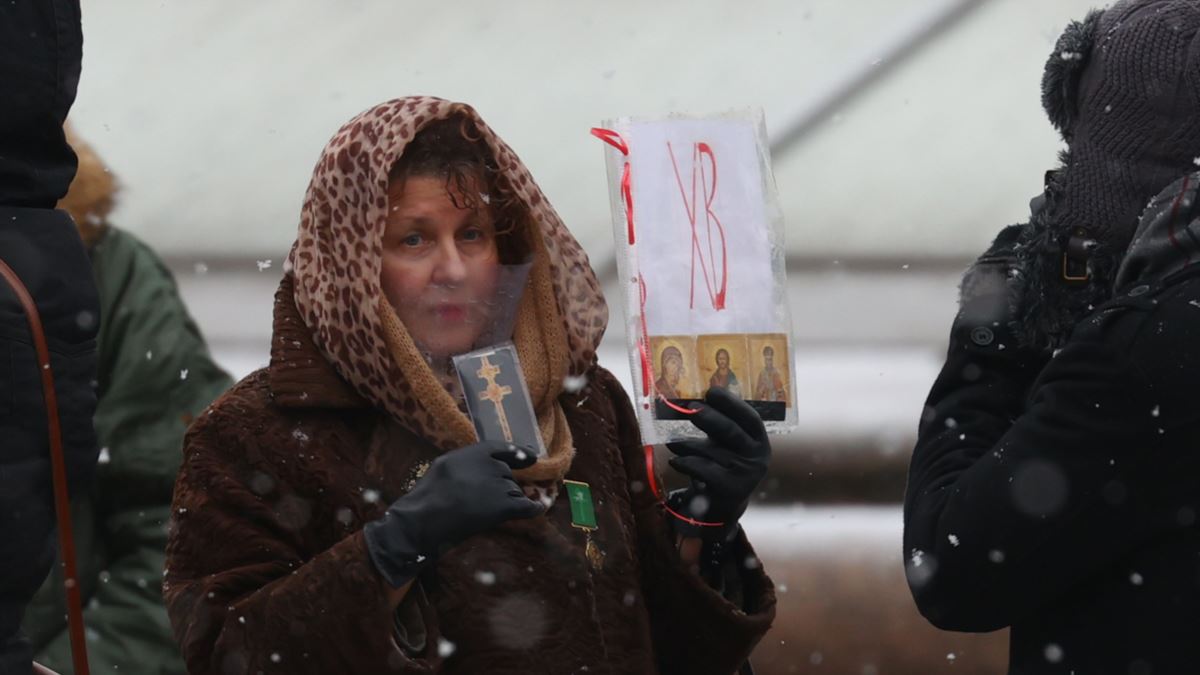
MINSK — A Belarusian human rights group says more than 100 people were detained in Minsk during the weekly rally of retirees calling on strongman Alyaksandr Lukashenka to step down.
Up to 150 protesters gathered at Independence Square in the center of the capital Minsk on December 14 for their customary Monday march, but security forces prevented them from moving along Independence Avenue.
The demonstrators then started rallying on the square itself, waving white-and-red flags, a symbol of the opposition, and shouting slogans such as “Get out!” and “Long live Belarus!” before the gathering was dispersed by police.
Some of the demonstrators hid in the nearby Church of Saints Symon and Alena, but at least 106 others were detained, according to the human rights group Vyasna.
The crackdown came a day after a total of 271 people were held at protests around the country, according to the Interior Ministry. Most of the arrests were reported in the capital.
Belarus has been roiled by nearly daily protests since early August when Lukashenka was declared victor of a presidential election that opposition leaders said was flawed.
Police have violently cracked down on the postelection protests, with more than 27,000 detentions, according to the UN. There have also been credible reports of torture and ill-treatment, and several people have died.
Many of Belarus’s opposition leaders have been arrested or forced to leave the country, while Lukashenka, who has ruled the country with an iron fist for almost three decades, has refused to negotiate with the opposition.
The United States, the European Union, and several other countries have refused to acknowledge Lukashenka as the winner of the vote, and imposed sanctions on Lukashenka and his allies, citing election rigging and the police crackdown.
On December 14 in Berlin, Belarusian opposition leader Svyatlana Tsikhanouskaya urged Germany to lift its visa requirement for Belarusian citizens and called for the expansion of EU sanctions.
“The punitive measures look ridiculous when we see how many people have been arrested so far: more than 30,000 since August,” Tsikhanovskaya, who left Belarus for neighboring Lithuania fearing for the safety of her family, told Der Spiegel magazine during her visit to the German capital.
“We need action,” she said.
Tsikhanovskaya met in Berlin with German President Frank-Walter Steinmeier, who praised the Belarusian people’s “bravery and persistence,” and the president of Germany’s parliament.
From Germany, Tsikhanouskaya is set to travel to Brussels for talks with EU foreign affairs chief Josep Borrell and members of the EU Parliament, before receiving the European Parliament’s prestigious Sakharov Human Rights Prize on December 16.
This post was originally published on Radio Free.
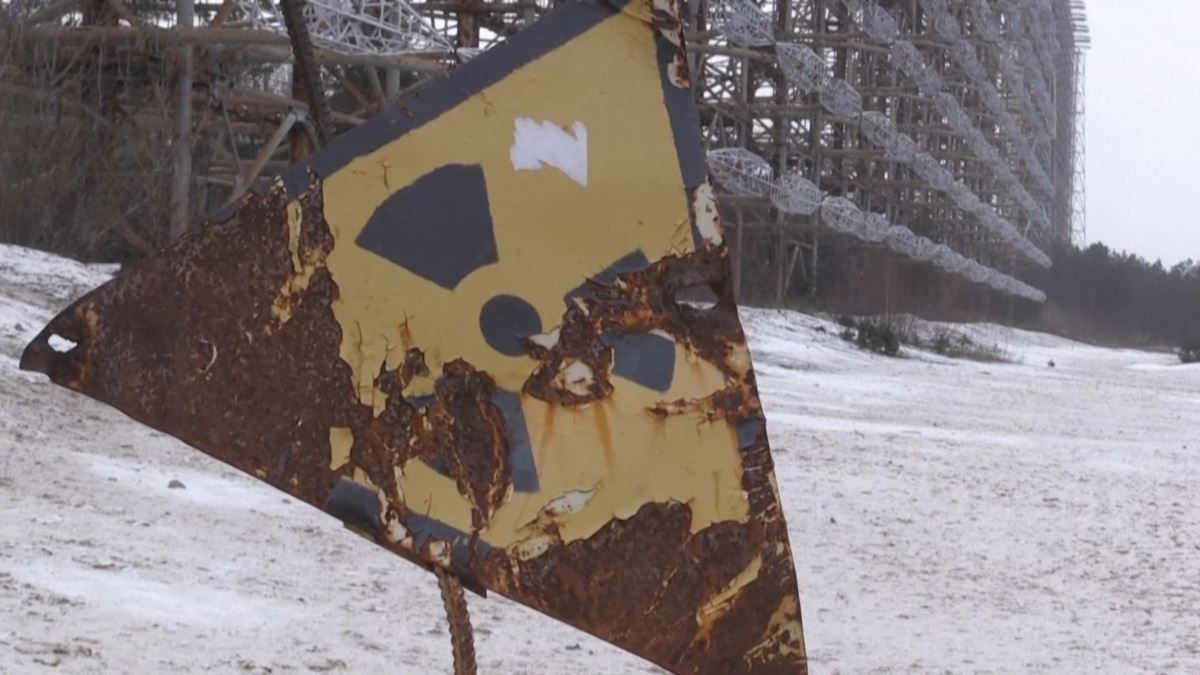
The Taj Majal and Stonehenge are UNESCO World Heritage sites and the Ukrainian government hopes that the exclusion zone around the radioactive wreckage of the Chernobyl nuclear plant will be added to the list. Ukraine’s culture minister cited the recent influx of tourists as evidence of Chernobyl’s importance “not only to Ukrainians, but to all of humanity.”
This post was originally published on Radio Free.
Security forces in Belarus detained dozens of people in the capital, Minsk, as opposition demonstrators staged scattered marches and rallies on December 13 to pressure strongman leader Alyaksandr Lukashenka to make political concessions. Human rights group Vyasna said that nearly 180 people were detained during protests across the country.
This post was originally published on Radio Free.
MINSK — Security forces in Belarus have detained dozens of people as opposition demonstrators staged scattered marches and rallies in Minsk and other cities to pressure strongman leader Alyaksandr Lukashenka to make political concessions.
Human rights group Vyasna said that nearly 180 people were detained during the protests on December 13, with most of the arrests reported in Minsk.
According to local news outlet Nasha Niva, more than 120 marches took places across the country, with numbers at each rally ranging from dozens to several hundred.
Some protesters marched in outlying residential areas of Minsk, waving white-and-red flags, a symbol of the opposition, and chanting “Long live Belarus.”
The demonstrations came as opposition leader Svyatlana Tsikhanouskaya was scheduled to appear at events in Germany, as part of her efforts to rally international support for Belarus’s beleaguered opposition.
The country has been roiled by unprecedented political opposition since early August when Lukashenka was declared victor of a presidential election that opposition leaders said was flawed.
Activists have defied often violent police tactics and organized weeks of demonstrations and rallies.
Still, the only hints of concession that Lukashenka has shown are suggestions he has made about drafting a new constitution.
In contrast to past weekend demonstration, Minsk authorities did not shutter the subway system on December 13, and no major Internet disruptions were reported.
Read our coverage as Belarusians take to the streets to demand the resignation of President Alyaksandr Lukashenka and call for new elections after official results from the August 9 presidential poll gave Lukashenka a landslide victory.
Many of Belarus’s opposition leaders have been arrested or forced to leave the country, including Tsikhanouskaya, who says she won the August election.
Tsikhanouskaya, who now lives in exile in neighboring Lithuania, hailed protesters who had gathered “despite repressions, violence and cold.
“They resist Lukashenka’s regime because the people of Belarus want to live in a democratic and free country,” she said in a post to Twitter.
The United States, the European Union, and several other countries have refused to acknowledge Lukashenka as the winner of the vote.
The European Union imposed sanctions on Lukashenka and his allies citing election rigging and a violent police crackdown.
This post was originally published on Radio Free.
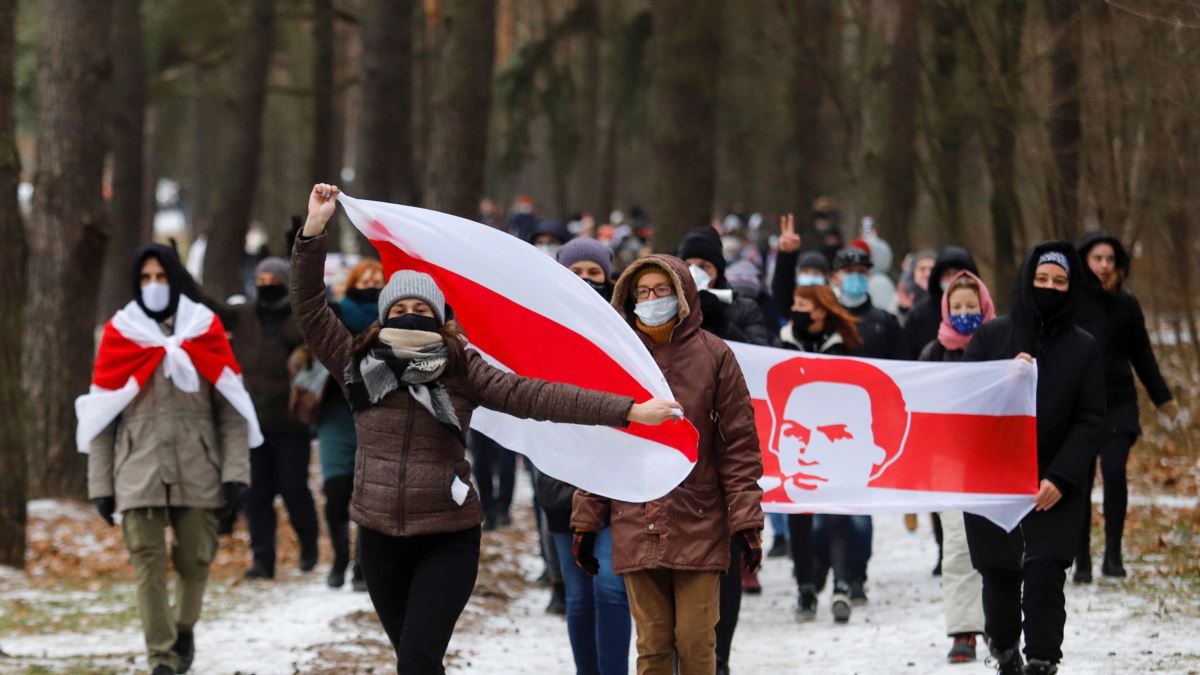
MINSK — Opposition demonstrators have staged scattered marches and rallies in the Belarusian capital and other cities as they pressed efforts to pressure strongman leader Alyaksandr Lukashenka to make political concessions.
The December 13 actions in Minsk and elsewhere came as opposition leader Svyatlana Tsikhanouskaya was scheduled to appear at events in Germany, as part of her efforts to rally international support for Belarus’s beleaguered opposition.
The country has been roiled by unprecedented political opposition since early August when Lukashenka was declared victor of a presidential election that opposition leaders said was flawed.
Activists have defied often violent police tactics and organized weeks of demonstrations and rallies.
Still, the only hints of concession that Lukashenka has shown are suggestions he has made about drafting a new constitution.
In contrast to past weekend demonstration, Minsk authorities did not shutter the subway system on December 13, and no major Internet disruptions were reported.
The human rights group Vyasna reported at least 28 people had been detained by mid-afternoon.
Many of Belarus’s opposition leaders have been arrested or forced to leave the country, including Tsikhanouskaya, who says she won the August election.
The United States, the European Union, and several other countries have refused to acknowledge Lukashenka as the winner of the vote.
This post was originally published on Radio Free.
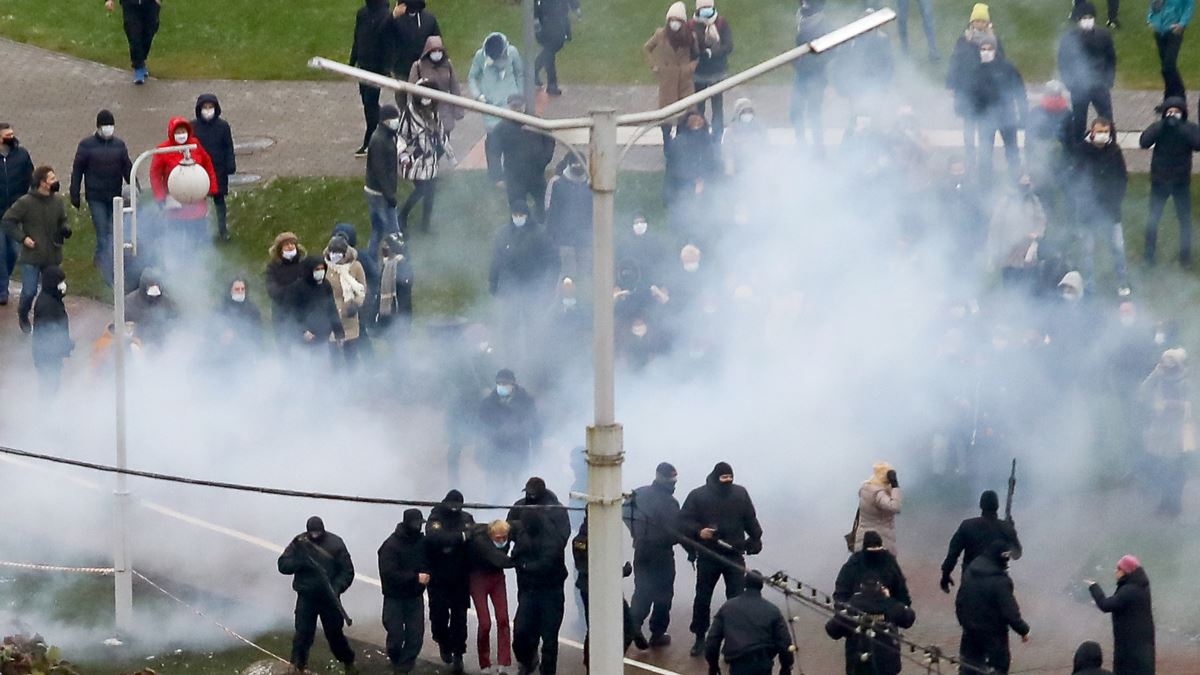
Switzerland has become the latest country to freeze the financial assets of Belarusian strongman Alyaksandr Lukashenka.
The Swiss government announced on December 12 that Lukashenka, his son Viktar, and 13 other Belarusians connected with the Lukashenka regime had been banned from entering or transiting through Switzerland.
The sanctioned officials are all believed to be involved in the violent suppression of protests that have swept Belarus since the disputed August 9 presidential election.
“Switzerland is deeply concerned by the ongoing tensions and is calling for dialogue between the Belarus government and civil society,” the Swiss government said in announcing the sanctions.
Official results of that poll gave Lukashenka a sixth presidential term, but the election has been widely criticized as rigged.
Since the election, the opposition has held regular protests, most of which have been met with harsh repression by the police.
According to the United Nations, more than 27,000 people have been detained. There have also been credible reports of torture and ill-treatment.
This post was originally published on Radio Free.
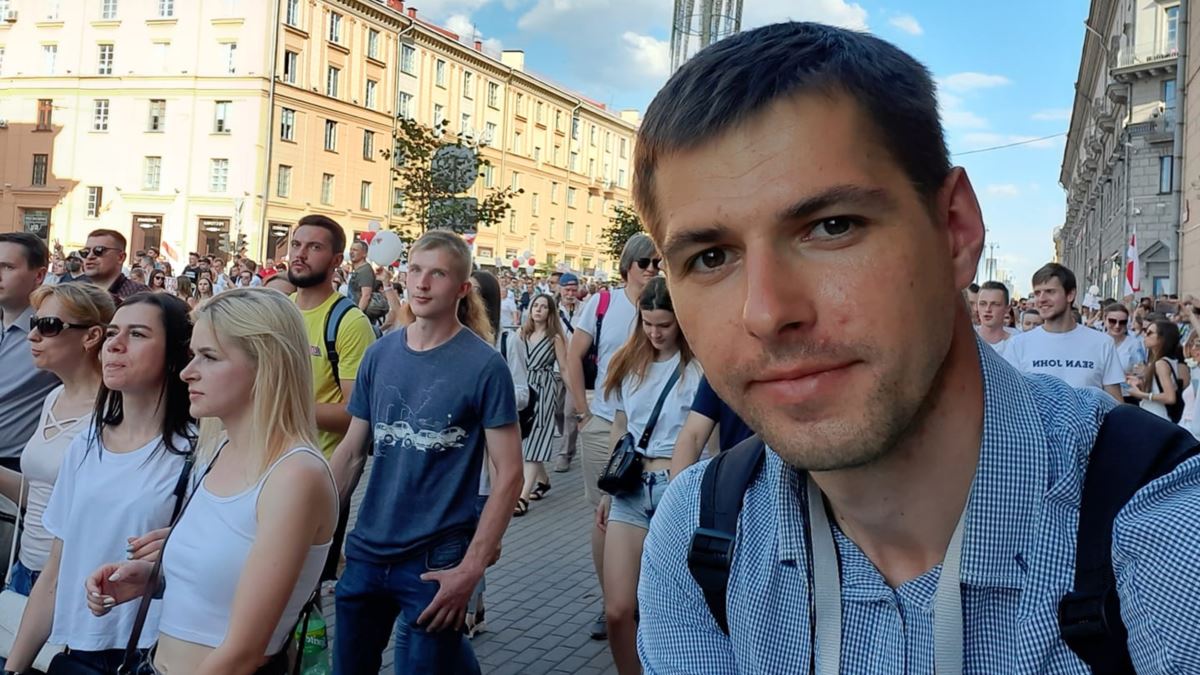
Belarusian security agents have seized the computer and documents of a journalist at Minsk’s airport after briefly holding him upon arrival from Ukraine.
Roman Vasyukovich, a correspondent for Current Time, the Russian-language network led by RFE/RL in cooperation with VOA, said some of his possessions were seized at the airport without explanation.
After being held for about an hour, Vasyukovich said he was released but his laptop was seized for examination of “extremist” content.
Vasyukovich has been covering the near-daily protests in Belarus against strongman Alyaksandr Lukashenka in the wake of August’s disputed presidential election.
Security forces have violently cracked down on the protest movement, with more than 27,000 detentions, according to the United Nations. There have also been credible reports of torture and ill-treatment, and several people have died.
Since August, at least 373 journalists have been arrested, six of whom are currently detained, the UN said earlier this month.
In October, the Belarusian Foreign Ministry revoked media accreditation from Current Time and other foreign media in an attempt to stifle reporting.
This post was originally published on Radio Free.
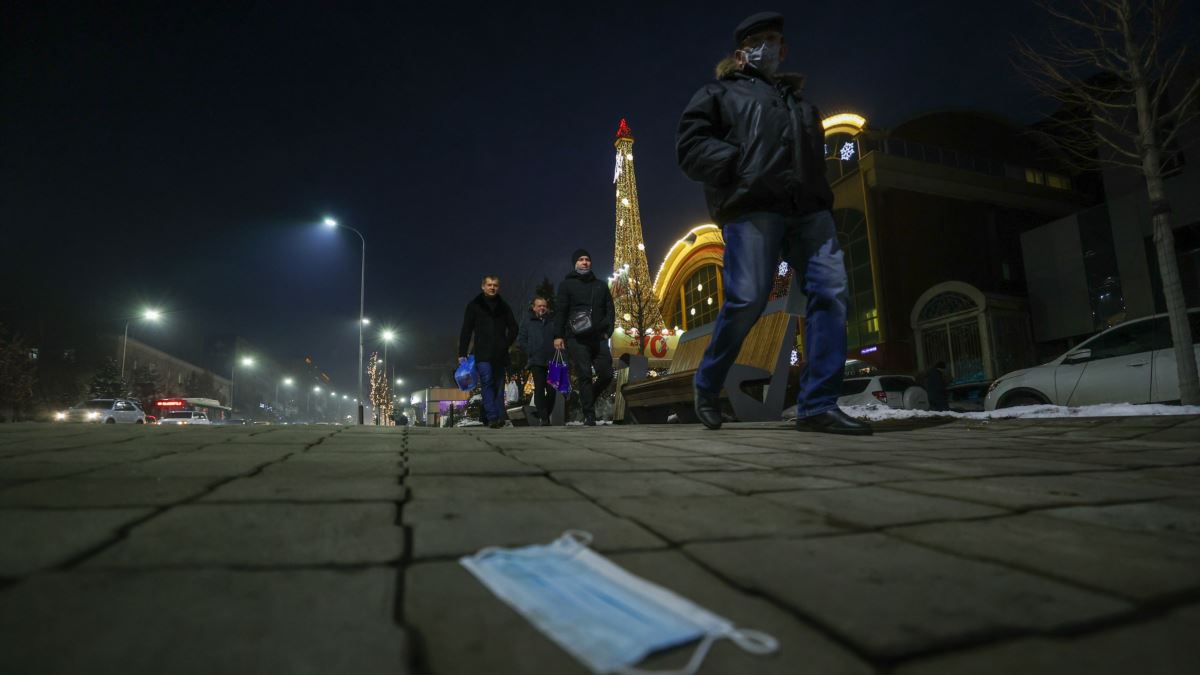
Foreign Ministers of the Commonwealth of Independent States (CIS) have approved a draft concept on further developing cooperation in several areas, including the coronavirus pandemic.
The Kazakh Foreign Ministry said in a statement that ministers approved a number of documents at the December 10 meeting, including a concept of military cooperation between CIS member states to 2025.
It added that the Council of the CIS leaders will be held online on December 18.
“The participants discussed a wide range of integration cooperation issues within the CIS, with a special emphasis on joint actions to overcome the negative effects of the coronavirus pandemic,” the Russian Foreign Ministry said after the meeting.
CIS members are former Soviet republics — Azerbaijan, Armenia, Belarus, Kazakhstan, Kyrgyzstan, Moldova, Russia, Tajikistan, and Uzbekistan. Turkmenistan has an associate status in the grouping.
Ukraine quit the grouping in 2018, four years after Russia forcibly annexed Ukraine’s Crimea region in March 2014 and started backing separatists in Ukraine’s east in a conflict that has killed more than 13,200 people since April 2014.
Ukraine was an associate member of the CIS since the grouping was established following the collapse of the Soviet Union in 1991.
Earlier, in 2009, another former Soviet republic, Georgia, quit the CIS following a five-day Russian-Georgian war in August 2008, after which Russia has maintained troops in Georgia’s breakaway regions of South Ossetia and Abkhazia and recognized their independence from Tbilisi.
This post was originally published on Radio Free.

MINSK — Belarus will close several land-border crossings as of December 20 due to the coronavirus pandemic, a move that will limit the movement of people at a time when the country is being rocked by protests over authoritarian Alyaksandr Lukashenka’s claim of victory in a disputed presidential election.
The national Internet portal for legal information on December 10 published a government resolution adopted earlier in the week, saying the measures, which include a ban on Belarusians travelling unless their trip is related to work or study, will take force 10 days after publication of the notice.
It is not clear how long the restrictions will be in place.
Belarus has since been hit by near-daily protests demanding Lukashenka resign, the release of all political prisoners, and a new election.
Security forces have violently cracked down on the protest movement, with more than 27,000 detentions, according to the United Nations. There have also been credible reports of torture and ill-treatment, and several people have died.
Opposition leaders, who say the August 9 election was rigged, immediately accused Lukashenka of using the COVID-19 measures as an excuse to impose restrictions on the movements of activists.
“Lukashenka closes inner borders of #Belarus because of Covid. Let’s be honest: the dictator just terrorizes the country & violates human rights on [a] daily basis,” opposition leader Svyatlana Tsikhanouskaya, who says she won the presidential poll, wrote on Twitter on December 10.
“He didn’t care about covid before. Now repressed Belarusians cannot flee and seek asylum abroad.”
The resolution orders “temporarily suspending the crossing of the state border of the Republic of Belarus for departure from the Republic of Belarus of citizens of the Republic of Belarus, as well as foreigners who have a permit for permanent or temporary residence in the Republic of Belarus.”
Restrictions will apply at all road, railway, and river checkpoints along the country’s borders. The ban does not apply to people with diplomatic and service passports, members of official delegations, drivers of international road transportation units, crews of aircraft and ships, train crews, individuals on business trips and some other categories of people.
Departure from the country will be also allowed once every six months for Belarusian citizens who are permanent residents of foreign countries or need to leave the country due to illness or the death of a close relative abroad, as well as for educational, employment, or medical purposes.
According to the resolution, when entering the country, foreign nationals will have to present test results proving that they are not infected with the coronavirus.
Lukashenka, who has ruled Belarus since 1994, has denied the accusations of election fraud and refuses to negotiate with the opposition.
The United States and European Union have both rejected the election results and have imposed sanctions on Belarus, as well as Lukashenka, over the issue.
As of December 10, the number of registered coronavirus cases in Belarus was 152,453, including 1,230 deaths and 129,950 recovered patients.
This post was originally published on Radio Free.
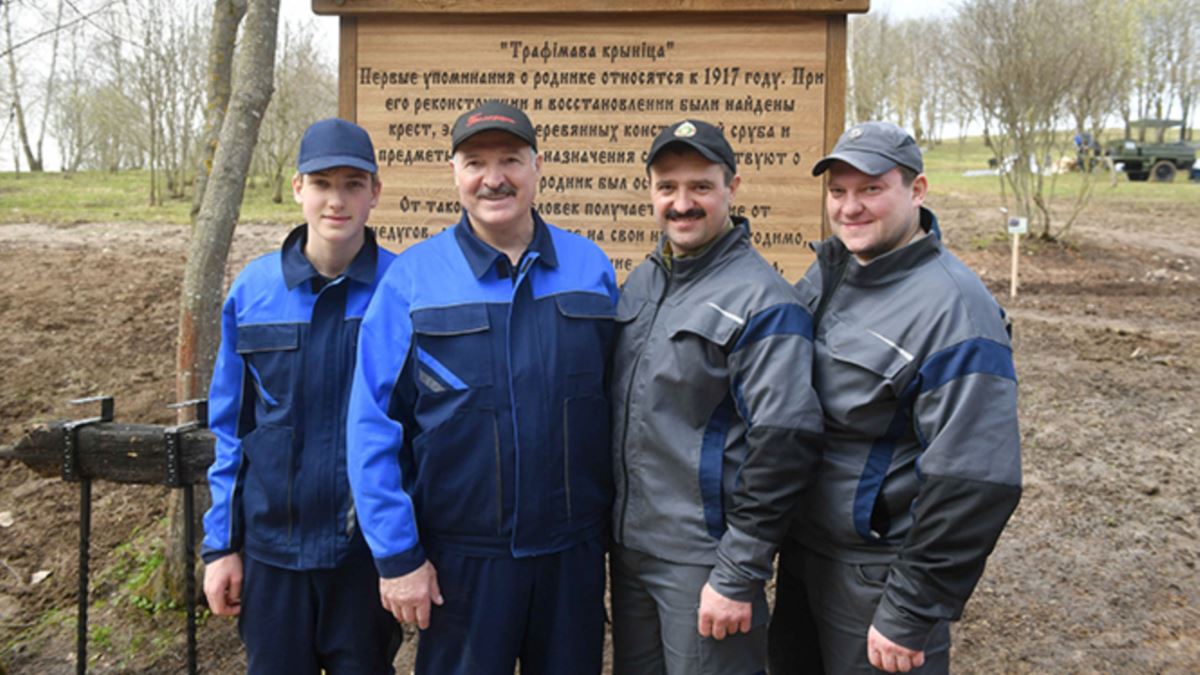
The International Olympic Committee (IOC) says it has suspended Belarusian strongman Alyaksandr Lukashenka and his son Viktar from all Olympic activities, including the Tokyo Olympic Games next year, and cut payments to the country’s National Olympic Committee (NOC) amid a violent crackdown against protesters following a disputed presidential election.
The IOC executive board made the decision on December 7, saying “the current NOC leadership has not appropriately protected the Belarusian athletes from political discrimination within the NOC, their member sports federations or the sports movement.”
“This is contrary to the fundamental principles of the Olympic Charter, and therefore seriously affects the reputation of the Olympic movement,” it said in a statement.
Lukashenka, who has led Belarus’s NOC for 23 years, claimed a sixth presidential term following an August 9 election that the opposition and the West say was rigged.
Belarus has since been hit by near-daily protests demanding Lukashenka resign, the release of all political prisoners, and a new election.
Security forces have violently cracked down on the protest movement, with more than 27,000 detentions, according to the UN. There have also been credible reports of torture and ill-treatment, and several people have died.
Meanwhile, much of the opposition leadership has been detained or forced into exile, and many Belarusian athletes have written to the IOC demanding urgent action, citing political discrimination and the imprisonment of sports figures by the authorities.
Lukashenka’s son Viktar, as the NOC’s first vice president, was also provisionally suspended by the IOC, along with NOC executive board member Dzmitry Baskau.
The IOC is also suspending “all financial payments” to the NOC, but will continue to help fund Belarusian athletes preparing for the Tokyo 2020 Olympic Games, which were delayed to next year, and the 2022 Winter Games in Beijing by paying scholarship money directly to them.
The moves do not affect Belarusian athletes’ right to compete as a recognized national team with their own flag and anthem, it noted.
However, the country’s status as co-host of the 2021 ice-hockey World Championships has come under threat, with the IOC saying it is looking into the issue.
IOC President Thomas Bach said after the organization’s board meeting that the International Ice Hockey Federation (IIHF) would discuss Belarus’s host role in the days ahead.
Last month co-host Latvia blacklisted the head of Belarus’s ice hockey federation as the Baltic country seeks to prevent its neighbor from co-hosting the tournament.
The IIHF has also “initiated a procedure” against the Belarus official who sits on its ruling committee, Bach said.
Losing the tournament would be a further blow to Lukashenka, who has cultivated an image as a sportsman, regularly taking to the ice to play hockey, his favorite sporting pastime.
The continued crackdown on protests has caused international outrage, with the European Union and the United States slapping sanctions on Lukashenka and his son, as well as dozens of other top Belarusian officials.
The bloc is expected to pass a third round of sanctions next week.
This post was originally published on Radio Free.
A court in Kyiv has upheld an extension of the pretrial detention of one of the suspects in the high-profile 2016 killing of journalist Pavel Sheremet in the Ukrainian capital.
This post was originally published on Radio Free.

People were seen being detained and others escaping from security forces in the Belarusian capital, Minsk, on another day of anti-government protests on December 6. Demonstrations have been ongoing since the controversial August 9 presidential election. Protesters have recently switched to marches in smaller groups across residential areas of Minsk.
This post was originally published on Radio Free.
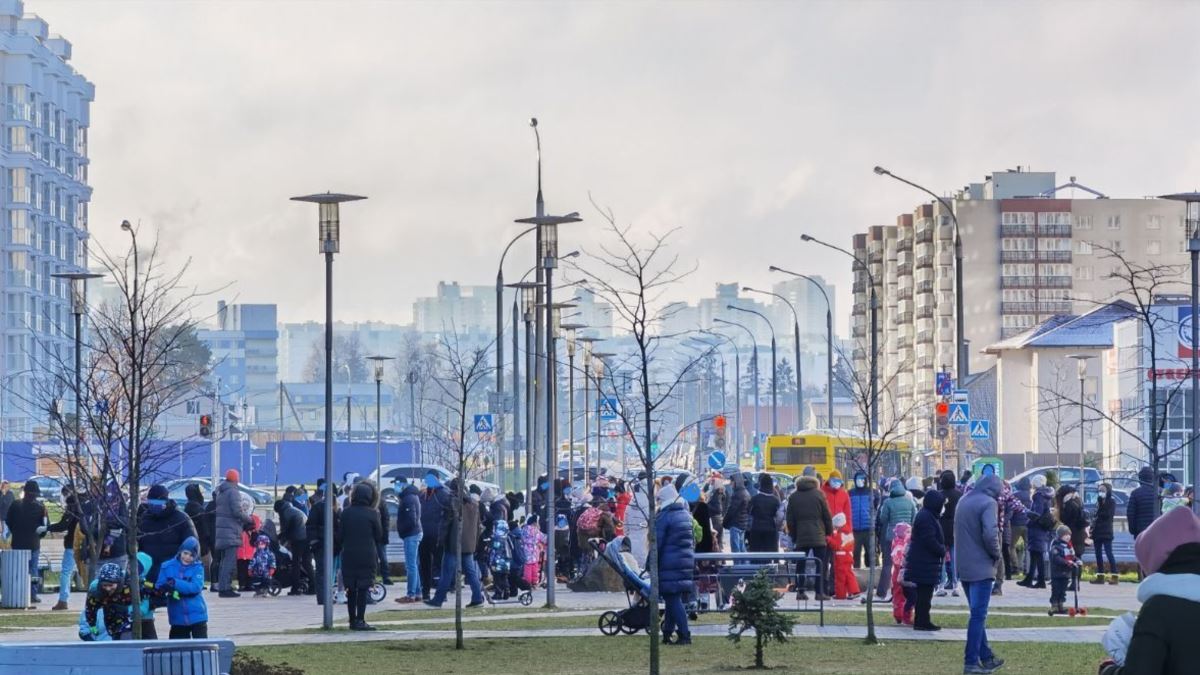
MINSK — Belarusian security forces detained people across the country on December 6 as street protests calling on authoritarian ruler Alyaksandr Lukashenka to resign continued.
Demonstrators gathered in Minsk and other Belarusian cities in nearly continuous protests since a disputed presidential election in August that the opposition says was rigged.
This is the third Sunday during which the demonstrations in Belarus are being held under the banner of March of Neighbors, a strategy adopted by the opposition as a way of decentralizing the protests and making it more difficult for police to round up activists.
The August 9 vote gave Lukashenka a sixth presidential term, but the opposition believes candidate Svyatlana Tsikhanouskaya was the real winner of the election and is calling for the strongman’s resignation, the release of all political prisoners, and a new election.
The West refuses to accept the outcome, slapping sanctions on Lukashenka and dozens of top Belarusian officials.
Amid an intensifying crackdown by the Belarusian authorities on the protest movement, detentions were reported on December 6 in several Minsk districts and other cities across the country, including Brest and Hrodna.
A 79-year-old woman was among those detained in the capital, where several subway stations were briefly closed and at least two squares were cordoned off by security forces.
Two BelaPAN journalists covering the demonstrations in Hrodna were held by police.
People in several Belarusian cities reported problems with accessing Telegram, an instant messaging service used by many protesters to communicate.
Tsikhanouskaya, who left the country soon after the election under pressure from the authorities and is currently in exile in Lithuania, said on December 5 she would “support everyone who comes out to their yard, district, and city.”
“Each march is a reminder that Belarusians will not give up. We will not allow our rights to be taken away and our eyes to be closed to crimes,” she said in a statement.
A week ago, security forces used tear gas and stun grenades against some demonstrators in Minsk and detained more than 300 protesters across the country, according to the Minsk-based Vyasna (Spring) human rights center.
This post was originally published on Radio Free.
Andrey Astapovich was a police investigator in Belarus when he publicly announced his defection from the service in August and exhorted his countrymen to “expel the dictator.”
Now, as he awaits the results of an asylum request from the Polish government, the 27-year-old is heading up a group of defectors from Belarusian law enforcement who are working to hold their former colleagues accountable for their actions in a continuing crackdown on protests over a disputed presidential election.
“We will collect evidence and document all the crimes of this regime, from the rigging of elections to police violence and extrajudicial murders,” Astapovich told RFE/RL by telephone from Warsaw on November 30.
Authoritarian leader Alyaksandr Lukashenka claimed a landslide victory and a sixth term in the August 9 vote, while opponents cried foul and accused him of falsifying the result. As large protests persist nearly four months later, the opposition continues to amass hours of video implicating law enforcement in brutal tactics against the demonstrators.
Much of the establishment has remained outwardly loyal to Lukashenka, who critics and Western governments say has remained in office since 1994 by crushing dissent and fixing elections. But the new group co-founded by Astapovich, which calls itself By_Pol (short for Belarus Police), is working from exile to coax them into dissent.
The idea of bringing together defectors from law enforcement came about in October, during a meeting in Poland between former state investigators, police officers, and prosecutors and exiled opposition leader Svyatlana Tsikhanouskaya, who supporters contend would have won the presidential election if the votes had been counted honestly.
Astapovich, who was a participant in that meeting, said that the ranks of Belarus’s law enforcement are split into two groups: those who chase protesters, wielding batons and firearms, and those he calls the “intellectuals” — senior-ranked civil servants with university degrees and an increasing sense of disillusionment with Lukashenka’s regime.
It’s the former whose actions receive media attention, Astapovich said, because they are on the streets trying to crush the protests.
“They give the impression of unity,” he said. “But those who actually make decisions are increasingly siding with the people. The system is collapsing.”
It is difficult to verify Astapovich’s claims, or the scale of disillusionment within the ranks of Lukashenka’s government. In written comments to RFE/RL, Tsikhanouskaya confirmed the October meeting with former officials in Warsaw and said the opposition needs their expertise to understand how to get more officials on its side and gain a deeper understanding of how Lukashenka’s regime works.
But while she stated that she sees “no obvious tendency” of desertion from Lukashenka’s security apparatus, she said many of its employees are simply afraid.
“We receive hundreds of messages from people in power who want to defect,” she said. “But the system is built in such a way that the authorities take revenge on everyone who quits. Therefore, many hold on to their places, and remain silent.”
One indication of By_Pol’s inside connections is the content on the group’s YouTube channel — more specifically, two leaked videos from cameras strapped to the chests of riot police officers as they worked on two recent Sundays to stamp out protests, which have gathered tens of thousands of views since their publication last week.
The clips provide perhaps the most candid glimpses yet of how riot police on the streets of Minsk operate. One features video from inside a riot van packed with arrested activists who sit cowering on the ground as they’re driven to a detention center. The other shows a group of armed riot police officers traveling in an unmarked minivan to a street protest. They slide open the door and issue shots from a firearm. “Prepare the grenades!” one shouts.
The second clip is dated October 25, the day riot police violently dispersed protesters gathered near the local headquarters of the Interior Ministry, and appears to have been filmed by someone taking part in the dispersal, Current Time reported on November 28. Current Time is a Russian-language network led by RFE/RL in cooperation with VOA.
Astapovich would not identify the source of the videos, but he said hundreds of law enforcement officers are feeding material to his group.
“They’re starting an insurrection from within the system,” he said. “We’ve launched this movement and with their help we’ll now fight the regime on our own terms.”
This post was originally published on Radio Free.
Security forces were seen detaining people at an anti-government march in the Belarusian capital, Minsk, on Sunday, November 29. With larger turnouts at the weekends, demonstrations against Alyaksandr Lukashenka have been ongoing since a disputed August 9 presidential election extended the strongman’s rule.
This post was originally published on Radio Free.
John Stuart-Jervis and Alan Fraenckel were in good spirits on September 12, 1995. They had a chance to win a prestigious international balloon race and were eager to cross into the airspace of Belarus, an exotic destination for the two Americans. However, the day was to end in tragedy with the two dead in a Belarusian forest after a military helicopter shot them down.
This post was originally published on Radio Free.
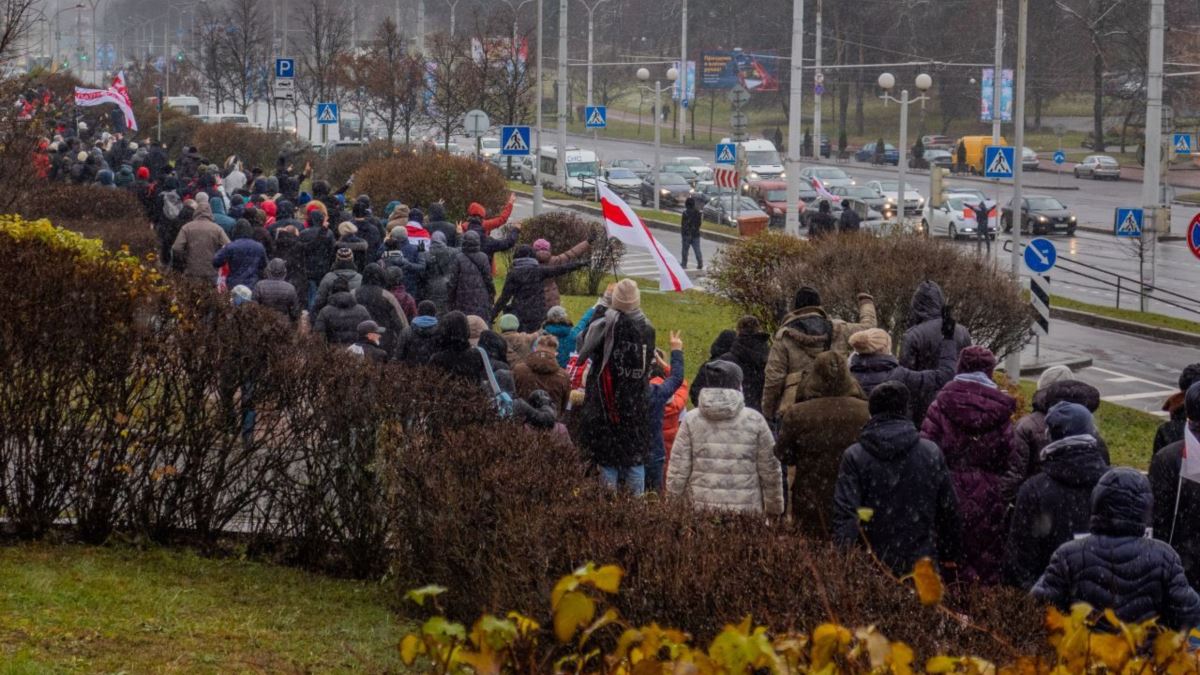
MINSK — Authorities in Belarus have detained dozens of protesters amid ongoing demonstrations aimed at ousting strongman Alyaksandr Lukashenka from the presidency.
At least 45 people were reported detained in Minsk and Barauliany on November 29. Other detentions were reported across the country.
This is the second week in which the Belarus demonstrations have been held under the rubric March of Neighbors. The opposition has adopted the strategy as a way of decentralizing the protests and making it more difficult for police to round up activists.
RFE/RL’s Belarus Service reported that law enforcement used tear gas and stun grenades against some demonstrators. Mobile Internet services were not available in Minsk and the central metro stations were closed.
Demonstrations were reported in almost all districts of the capital.
One video posted on social media appeared to show police in Minsk dragging away an unconscious person near the Pushkin metro station.
It was unclear how many people participated in the demonstrations.
Belarus has seen nearly continuous protests since a disputed presidential election on August 9 gave Lukashenka a sixth presidential term. The United States and the European Union have not recognized Lukashenka’s reelection.
The opposition has been calling for Lukashenka’s resignation, the release of all political prisoners, and a new election.
During a visit to a Minsk hospital on November 27, Lukashenka implied that he would resign if a new constitution was adopted.
“I will not work as president with you under the new constitution,” state media quoted him as saying.
Lukashenka has called several times for a new constitution, but the opposition has dismissed the statements as a bid to buy time and stay in power.
A former collective farm manager, Lukashenka, 66, has ruled Belarus since 1994.
This post was originally published on Radio Free.

MINSK — Authorities in Belarus have detained dozens of protesters amid ongoing demonstrations aimed at ousting strongman Alyaksandr Lukashenka from the presidency.
At least 45 people were reported detained in Minsk and Barauliany on November 29. Other detentions were reported across the country.
This is the second week in which the Belarus demonstrations have been held under the rubric March of Neighbors. The opposition has adopted the strategy as a way of decentralizing the protests and making it more difficult for police to round up activists.
RFE/RL’s Belarus Service reported that law enforcement used tear gas and stun grenades against some demonstrators. Mobile Internet services were not available in Minsk and the central metro stations were closed.
Demonstrations were reported in almost all districts of the capital.
One video posted on social media appeared to show police in Minsk dragging away an unconscious person near the Pushkin metro station.
It was unclear how many people participated in the demonstrations.
Belarus has seen nearly continuous protests since a disputed presidential election on August 9 gave Lukashenka a sixth presidential term. The United States and the European Union have not recognized Lukashenka’s reelection.
The opposition has been calling for Lukashenka’s resignation, the release of all political prisoners, and a new election.
During a visit to a Minsk hospital on November 27, Lukashenka implied that he would resign if a new constitution was adopted.
“I will not work as president with you under the new constitution,” state media quoted him as saying.
Lukashenka has called several times for a new constitution, but the opposition has dismissed the statements as a bid to buy time and stay in power.
A former collective farm manager, Lukashenka, 66, has ruled Belarus since 1994.
This post was originally published on Radio Free.
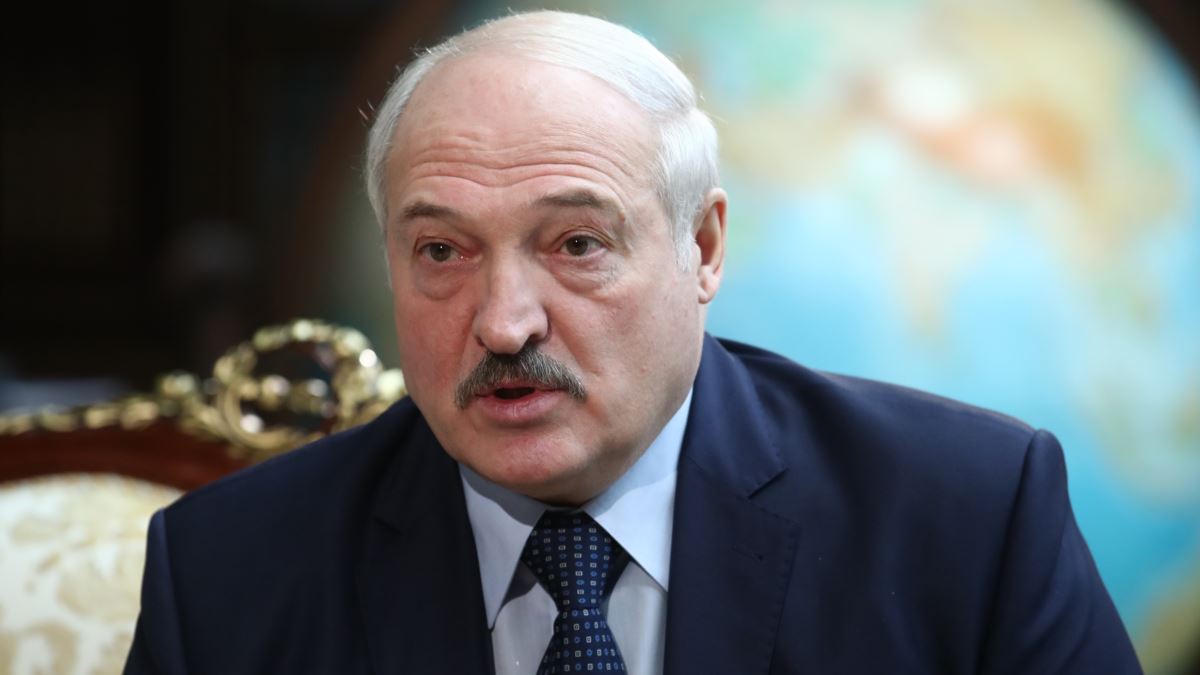
Embattled strongman Alyaksandr Lukashenka, who has ruled Belarus for 26 years, has said he would leave his post after a new constitution had been adopted, Belarus’s Belta news agency quoted him as saying.
“I will not work as president with you under the new constitution,” Lukashenka said during a visit to a Minsk hospital on November 27.
He didn’t specify when that day would come, but stressed the need for amendments to the constitution and adjustments to presidential powers.
Lukashenka has mentioned the possibility of changes to the constitution several times in the past, but the opposition has dismissed his comments as an attempt to buy time and stay in power while cracking down on anti-government protesters.
WATCH: Lukashenka Visits Hospital, Shakes Hands Without Gloves, Mask
Belarus has been rocked by protests since an August 9 presidential election handed Lukashenka a sixth term amid allegations of widespread fraud. Protesters say opposition candidate Svyatlana Tsikhanouskaya was the real winner of the vote.
Ahead of the August election, Tsikhanouskaya had said that if she’s elected president, she’d organize a referendum to bring back the 1994 constitution that limited presidential powers.
Lukashenka has repeatedly said he has no plan to step down. Earlier this month, Lukashenka reiterated that he had no intention of handing over power to anyone, and accused protesters of planning a “color revolution” — a term often used to describe pro-Western political upheavals.
“No power transfer! No successors! Whoever is elected by the people must stay [in power],” he said on November 13.
The United States and the European Union have refused to recognize the 66-year-old Lukashenka as the legitimate leader of Belarus.
This post was originally published on Radio Free.
By Thomas Rozanov
I first experienced the value of political freedom in the 2004 Orange Revolution protests in Kyiv, Ukraine. I was only seven years old then, yet I quickly caught inspiration for the rapidly evolving ‘PORA’ and ‘Tak!’ movements and the revolution. Next, fast-forward ten years, and I was driven by the 2014 Euromaidan movement.

2014 Ukrainian Euromaidan protests
Reuters/Gleb Garanich
It is extremely important to have the right to gather inspired people, to freely voice opinions, to strive to achieve justice and change. My energy was bursting at both periods, just as millions of other like-minded people. I cannot imagine how it would be to not be able to release this collective energy, to dream, to unite, to speak out, to protest. These events let the most important lesson be revealed and re-emphasized—the value of political freedom, which should be recognized and respected.
Today, we must be reminded of the value of political freedom and the right to protest when it is repeatedly brutally offended by government authorities in Russia and Belarus.
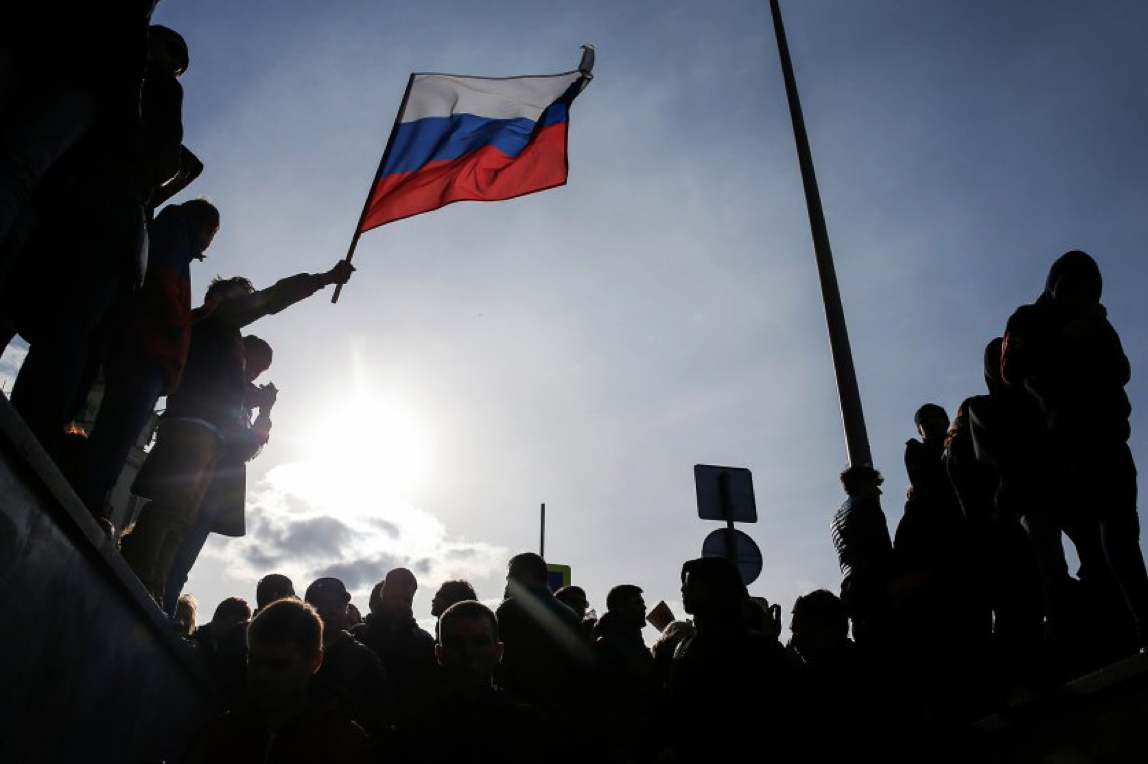
Opposition supporters attend a rally in Moscow, Russia, on March 26, 2017
Reuters/Maxim Shemetov
In Russia, opposition leader Alexei Navalny was sentenced to 15 days in prison and thousands of peaceful protesters were detained after mass anti-corruption demonstrations were held across Russia in late-March. According to independent sources, over 1,000 people were taken into custody in Moscow alone, with hundreds more people detained in cities across Russia for involvement in the protests.
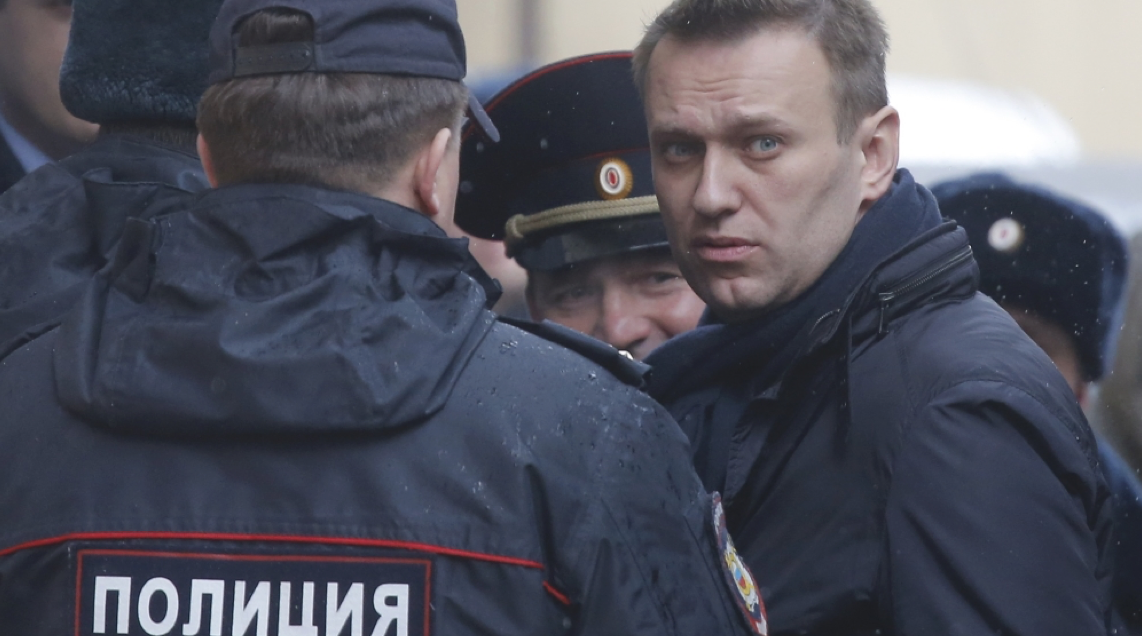
Alexei Navalny escorted upon arrival for a hearing after being detained at the anti-corruption protest
Reuters/Maxim Shemetov
“By detaining hundreds of protesters, the Russian authorities have demonstrated their profound disdain for the right to freedom of expression and assembly,” said Sergei Nikitin, Director of Amnesty International Russia.
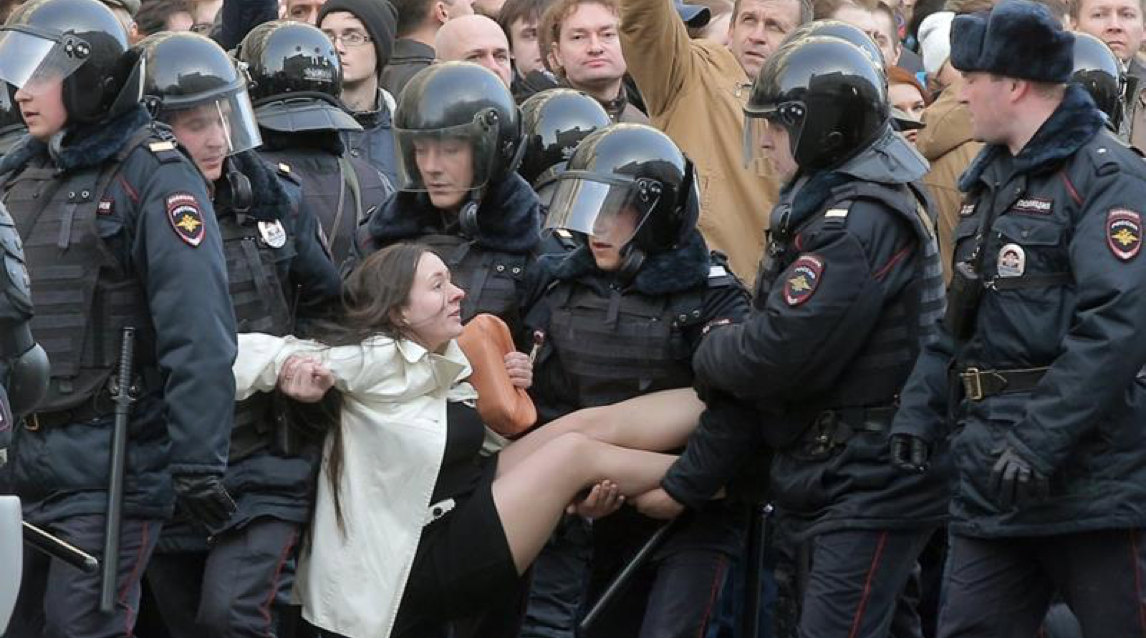
Police detain a protester during the anti-corruption demonstration in Moscow on March 26, 2017
EPA/Maxim Shipenkov
Out of over 80 rally authorization requests submitted to local authorities across Russia, only 21 approvals were granted. Hence, protesters in Moscow and St. Petersburg gathered despite de facto bans in place.
Further repression was directed towards employees and volunteers of the Russian Anti-Corruption Foundation (ACF) founded by Alexei Navalny. The ACF provided a livestream of the protests from their Moscow office, as an alternative to state-run and controlled media which ignored the significant political event. According to the ACF, the stream gained over 170,000 live views, and over 4.47 million recorded views. There were two attempts to interrupt the broadcast by law enforcement officers, first by searching the ACF office for explosives, and later by an alleged fire alarm.
Police arrested 12 ACF staff and volunteers, and pushed administrative charges and detention ranging from five to seven days for “disobeying police officers’ legitimate orders”. Trials were conducted over two days, on March 27 and 28, only one day after the protest rallies.
Leonid Volkov, the ACF’s project manager and head of Alexei Navalny’s presidential campaign was sentenced to 10 days of administrative detention.
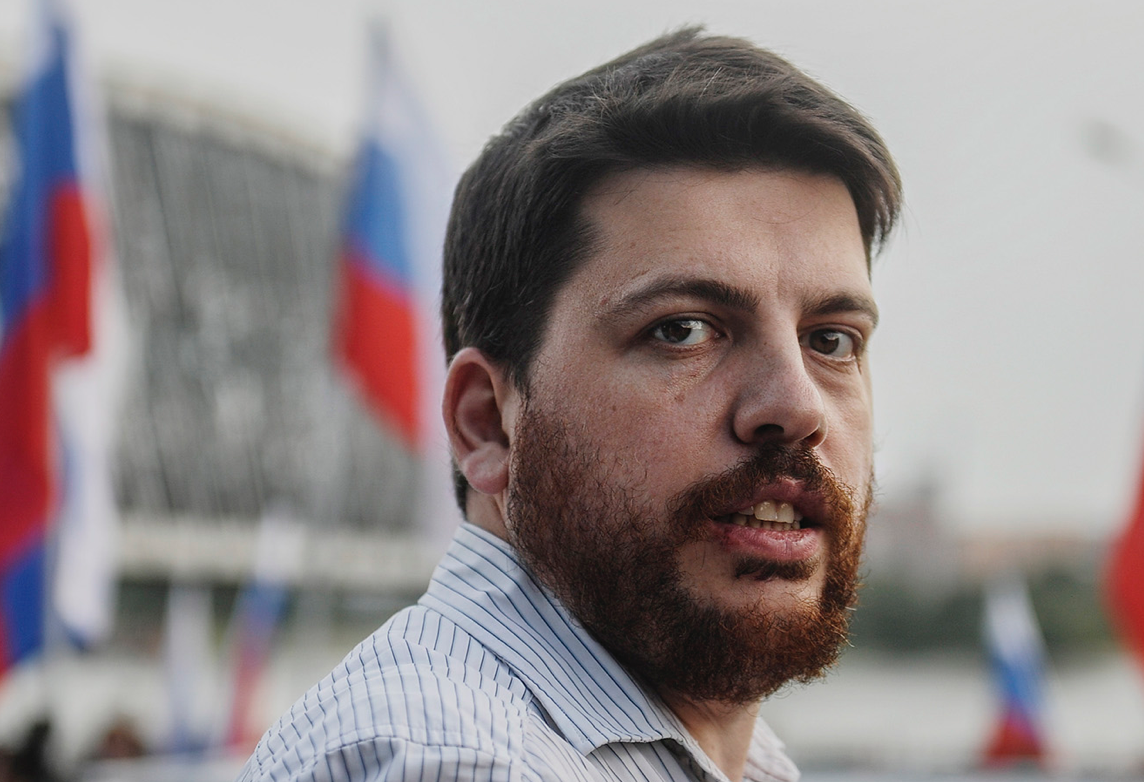
Leonid Volkov
Image from Open Russia
Amnesty International calls on Russian authorities to end reprisals against peaceful protesters, political activists, and journalists. Amnesty urges to release all detained members of the ACF, and other prisoners of conscience. Russian authorities should respect the rights to freedom of expression, association and peaceful assembly, and abstain from any further attempts to prevent ACF employees and volunteers from the legitimate exercise of these rights.
Amnesty notes that the office searches, confiscation of computers and documents undermines ACF’s ongoing work, and uncovers individual sources which are now in danger of facing criminal prosecution for exposing corruption.
More details on the ACF arrests may be found in the Amnesty’s report ‘Russian Federation: Detained Members of Corruption Watchdog Are Prisoners of Conscience and Should Be Freed Immediately,’ released on March 31, 2017.
In Belarus, a day prior to the March 26 protests across Russia dozens of peaceful protesters were arrested with the use of excessive force by police for participating in the yearly ‘Freedom Day’ held on March 25 commemorating the creation of the Belarusian People’s Republic (BPR) in 1918.
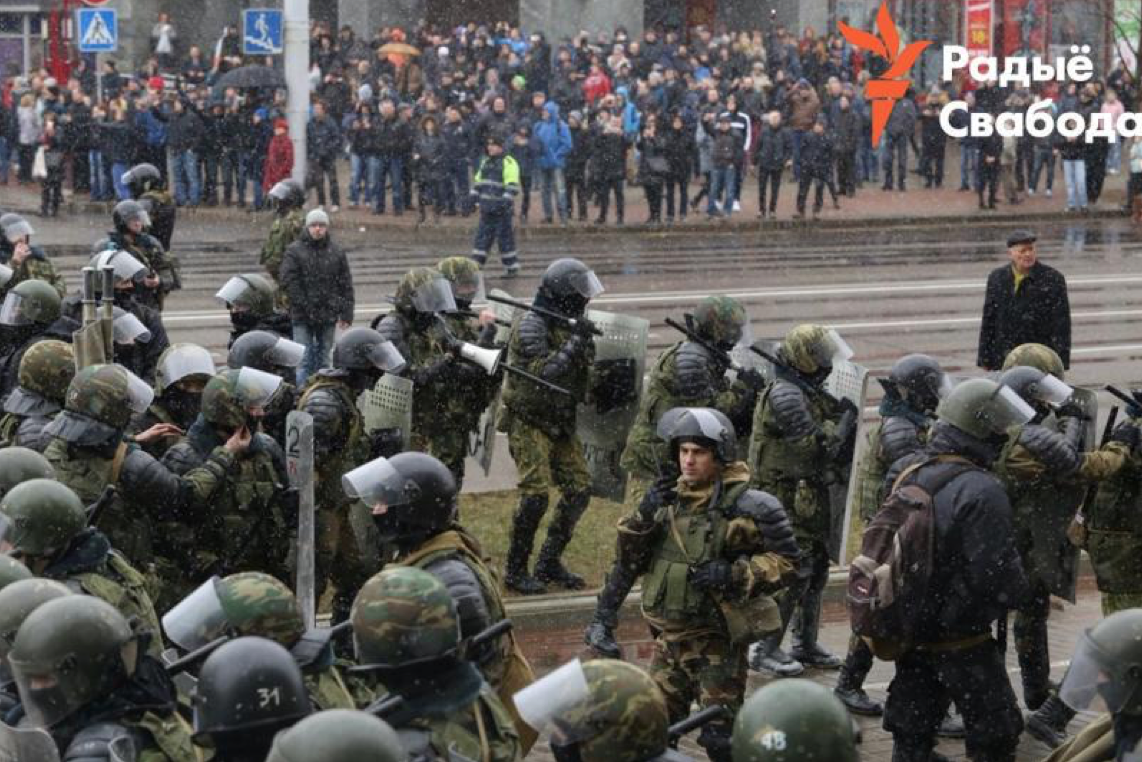
Riot police and protesters amid a rally in Minsk, Belarus on March 25
Radio Liberty
“Freedom Day proves this year more than ever, how little genuine freedom the people of Belarus have,” said Denis Krivosheev, Deputy Director for Europe and Central Asia at Amnesty International.
This followed the oppression of the prominent human rights group ‘Vyasna,’ and the detention of over 48 protesters, including civil society leaders and journalists across Belarus on March 10, 11, and 12, 2017. Many of those detained were involved in the mid-February anti-Presidential decree protests, in response to the Presidential decree “on Prevention of Social Dependency” which introduced a special tax for the unemployed and those who have not contributed taxes for over six months.
This decree triggered significant political upheaval in Belarus. “With basic freedoms strangled in Belarus, it has been years since we saw protests of this scale,” said John Dalhuisen, Amnesty International’s Regional Director for Europe and Central Asia.
For more info and background on the past Belarussian events please view the ‘Belarus: Biggest crackdown in years as dozens detained at peaceful protests’ news post dating March 13, 2017.
This post was originally published on Human Rights Now.